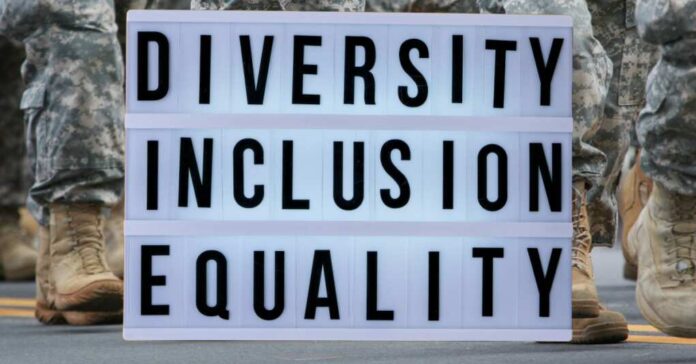
In an era where everyone from coffee shops to corporate giants seems fixated on the woke wave of Diversity, Equity, and Inclusion (DEI), the U.S. military has not just boarded this trendy train but appears to be trying to drive it. Critics argue this foray into what they view as a far-left culture war is not just a minor detour but a perilous deviation from the military’s core mission of national defense.
As Pentagon officials casually dismiss concerns, an ever-growing body of evidence suggests that these progressive ideologies concerning race, gender, and sexuality are fast becoming more than just a sidebar; they’re increasingly steering the whole organizational strategy, particularly within the administrative echelons of the armed forces.
Representative Bob Good of Virginia expressed his dismay: “The Biden Administration prioritizes woke Diversity, Equity, and Inclusion (DEI) initiatives over the fundamental duty of protecting Americans.” Good emphasizes the importance of maintaining the military’s focus on training patriotic individuals to uphold its status as the world’s most formidable fighting force.
One particularly ridiculed instance involved the U.S. Department of Defense describing diversity as a “strategic imperative” in a social media post. This post highlighted the prioritization of DEI initiatives, showcasing a departure from traditional military values.
Lawmakers argue that this emphasis on DEI is a wasteful distraction and potentially perilous. Senator Marco Rubio of Florida asserts that such rhetoric undermines the seriousness of the military in the eyes of adversaries like China, emphasizing the importance of projecting strength on the global stage.
Representative Jim Banks of Indiana penned a letter to Defense Secretary Lloyd Austin, expressing concern over the excessive focus on DEI. Banks criticizes the notion that diversity is essential for mission readiness, pointing out the unsupported claims made by the Pentagon and the White House.
Despite previous initiatives like the “Stand-Down to Address Extremism in the Ranks,” which found no disproportionate presence of violent extremists in the military, the Pentagon continues to invest in administrative equity efforts. These efforts, highlighted by the creation of various committees and implementation plans, come with hefty taxpayer costs.
A recent policy change was an internal language guide, which promoted how far left the U.S. military has gone. The language guide eliminated a range of expressions from the intelligence community’s vernacular that are believed to perpetuate stereotypes or have the potential to incite racial bias because hurting terrorist feelings is now important.
Rubio and Representative Chip Roy of Texas released a report detailing the infiltration of DEI into military training. Examples include cautioning Air Force cadets against using gendered language and lecturing West Point cadets on white privilege. Critics argue that such initiatives are divisive and counterproductive to military cohesion and readiness.
Mike Gonzalez of the Heritage Foundation emphasizes the detrimental impact of DEI on military recruitment and competitiveness. He suggests that while some private corporations are distancing themselves from DEI practices, the Biden Administration remains steadfast in embracing these ideologies, driven either by ideological commitment or political expediency.
Meanwhile, our top rival has taken the opposite approach. China has recently implemented a new policy that prohibits the appearance of “effeminate” men on television broadcasts. The Chinese government has stated that this policy is intended to promote “traditional Chinese culture, revolutionary culture, and socialist culture” by calling for a “corrected beauty standard” and a boycott of certain forms of entertainment.
As the debate rages on, lawmakers continue to advocate for a return to traditional military values and a renewed focus on national security. The future direction of the U.S. military hangs in the balance as it grapples with the implications of its drift into the realm of woke culture.














